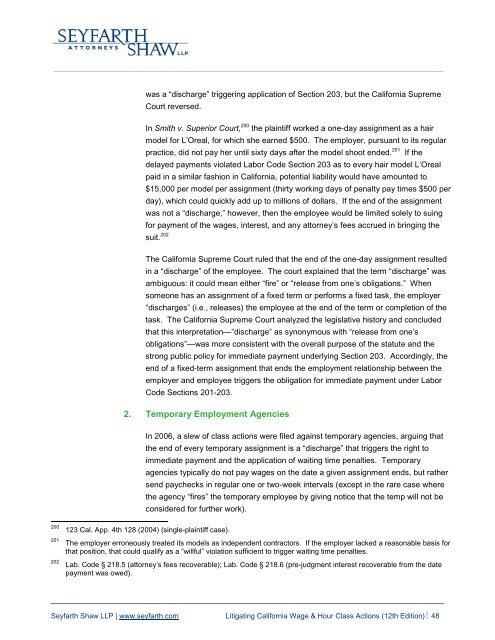Litigating California Wage & Hour and Labor Code Class Actions
Litigating California Wage & Hour and Labor Code Class Actions
Litigating California Wage & Hour and Labor Code Class Actions
You also want an ePaper? Increase the reach of your titles
YUMPU automatically turns print PDFs into web optimized ePapers that Google loves.
was a “discharge” triggering application of Section 203, but the <strong>California</strong> Supreme<br />
Court reversed.<br />
In Smith v. Superior Court, 200 the plaintiff worked a one-day assignment as a hair<br />
model for L’Oreal, for which she earned $500. The employer, pursuant to its regular<br />
practice, did not pay her until sixty days after the model shoot ended. 201 If the<br />
delayed payments violated <strong>Labor</strong> <strong>Code</strong> Section 203 as to every hair model L’Oreal<br />
paid in a similar fashion in <strong>California</strong>, potential liability would have amounted to<br />
$15,000 per model per assignment (thirty working days of penalty pay times $500 per<br />
day), which could quickly add up to millions of dollars. If the end of the assignment<br />
was not a “discharge,” however, then the employee would be limited solely to suing<br />
for payment of the wages, interest, <strong>and</strong> any attorney’s fees accrued in bringing the<br />
suit. 202<br />
The <strong>California</strong> Supreme Court ruled that the end of the one-day assignment resulted<br />
in a “discharge” of the employee. The court explained that the term “discharge” was<br />
ambiguous: it could mean either “fire” or “release from one’s obligations.” When<br />
someone has an assignment of a fixed term or performs a fixed task, the employer<br />
“discharges” (i.e., releases) the employee at the end of the term or completion of the<br />
task. The <strong>California</strong> Supreme Court analyzed the legislative history <strong>and</strong> concluded<br />
that this interpretation—”discharge” as synonymous with “release from one’s<br />
obligations”—was more consistent with the overall purpose of the statute <strong>and</strong> the<br />
strong public policy for immediate payment underlying Section 203. Accordingly, the<br />
end of a fixed-term assignment that ends the employment relationship between the<br />
employer <strong>and</strong> employee triggers the obligation for immediate payment under <strong>Labor</strong><br />
<strong>Code</strong> Sections 201-203.<br />
2. Temporary Employment Agencies<br />
In 2006, a slew of class actions were filed against temporary agencies, arguing that<br />
the end of every temporary assignment is a “discharge” that triggers the right to<br />
immediate payment <strong>and</strong> the application of waiting time penalties. Temporary<br />
agencies typically do not pay wages on the date a given assignment ends, but rather<br />
send paychecks in regular one or two-week intervals (except in the rare case where<br />
the agency “fires” the temporary employee by giving notice that the temp will not be<br />
considered for further work).<br />
200<br />
201<br />
202<br />
123 Cal. App. 4th 128 (2004) (single-plaintiff case).<br />
The employer erroneously treated its models as independent contractors. If the employer lacked a reasonable basis for<br />
that position, that could qualify as a “willful” violation sufficient to trigger waiting time penalties.<br />
Lab. <strong>Code</strong> § 218.5 (attorney’s fees recoverable); Lab. <strong>Code</strong> § 218.6 (pre-judgment interest recoverable from the date<br />
payment was owed).<br />
Seyfarth Shaw LLP | www.seyfarth.com <strong>Litigating</strong> <strong>California</strong> <strong>Wage</strong> & <strong>Hour</strong> <strong>Class</strong> <strong>Actions</strong> (12th Edition) 48
















